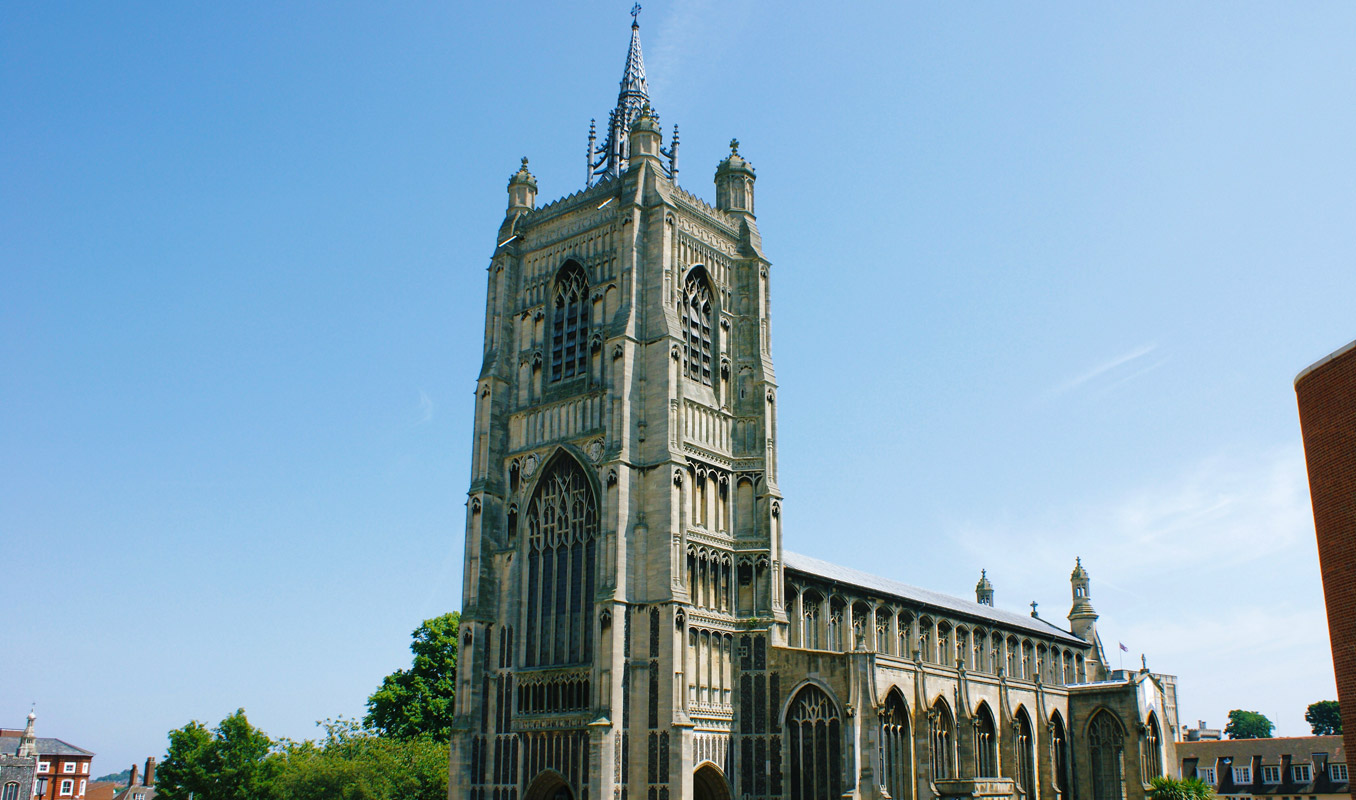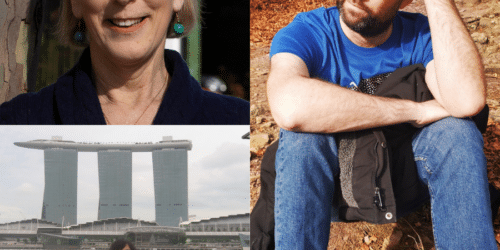
‘The Miracle of St Peter Mancroft’ is written by Ivanka Mogilska, a Bulgarian writer who stayed in Norwich on a residency in 2018. It is translated from the original text by Lora Petrova.
Don’t miss our podcast with Ivanka, in which she discusses the inspiration and development of the story. Includes a reading of the story by Peggy Hughes:
Anastasia Sabeva got lost almost immediately after the tour guide told them they had the afternoon free to explore the city on their own. Anastasia didn’t have any particular place in mind to visit, had a rather vague idea of her whereabouts, and wasn’t completely sure she could find her way back to the hotel. She was making yet another round of the open-air market – the shopkeepers had already started putting away their merchandise and cleaning their stalls – her left knee was twinging, and she was thirsty and exhausted. Many years ago, in school, she had studied French. She had picked up a handful of words in English while helping her children with their homework back in the day. All those English language courses she had attended over the years were left unfinished – something always came up. She managed to buy a bottle of water from a smiling lady her own age by stuttering and agitated finger pointing, and even scored a free salad in a carton bowl as a gift.
She was tossing the wilted cucumber slices, the tart beans and the onions in her mouth and was wondering what to do with the remaining hours until dinner time. And then it started raining. She glanced over the deserted market and finally noticed the church dome towering over the colourful stall tents. Limping, she made her way to the church. Sudden serenity overcame her once she entered, leaving the city clamour outside the doorstep.
Streams of softened, murky light seeped through the large windows, glided over the empty pews and formed rivulets on the floor. She sat down and looked around. To her surprise, the church walls were white and empty, without icons, and the interior was welcoming and festive (as if someone was preparing for a family celebration – at least that’s what she imagined) – a stark contrast with the imposing and rigid exterior.
She unbuttoned her coat and sat in silence for a moment, her knee throbbing with pain, her whole being asking to go home. But she was far from home.
This trip was a gift from her children a year after their father passed away. Why England, why Norwich, she never knew. Maybe there was a free spot in one of those 55+ group trips. She didn’t want to hurt them and never told them a trip with her children would make her much happier, even if it was just a car ride to the next village over. She asked what clothes to take, stuffed two umbrellas into her luggage (which she eventually forgot in the hotel) and went on the trip. She couldn’t make any friends in the group. Everyone was on the trip with their spouse or friends. Everyone had ideas, plans and opinions on what was to be done. She didn’t have any. During those long days and even longer nights over the past year she had played her life on a loop in her mind, if only to avoid answering the question that was pushing and shoving its way through her memories, not always quite succeeding in her effort – “What are you going to do now, Anastasia?” Her children were all grown up. Good children, caring children, but they had their own lives now. Her friends were busy raising grandchildren and tomatoes. Her husband was finally at peace. She could do whatever her heart desired. But she had absolutely no idea what she wanted. She married young – for love, but also to get away from her overbearing father. Turned out that the father of her children also had ideas about what Anastasia wanted and needed and what was good for her. She didn’t want to upset him, so she agreed with him. Her marriage lasted 40 long and happy years. Then her husband died and Mrs. Sabeva was left alone with her grief and with an unsettling feeling that something had to change in her life, but there was no one to tell her what it was.
And there she was now, thousands of miles away from home – a paper fork in one hand (she hadn’t seen one of those, so she kept it), a bottle of water in the other – sitting alone in a protestant church in Norwich, unable to quite decide what she wanted. Not that there was anyone who would be upset by her decisions, if they disapproved of them but… what would the late Mr. Sabev say if he could see her now? Later, she thought, I should call the children to tell them I am having a great time.
She got up and went about the church. Anastasia’s grandmother had baptised her in secret as a child, but she had accepted that God was forbidden and hadn’t attempted to connect with Him. She didn’t want to endanger her family. The houses of those Englishmen looked like something out of a film – even their churches resembled a motion picture set. She could see herself starting a new life here. Not that she had the money, not that she wanted to, but there was no one to stop her.
There wasn’t a single soul around. Her footsteps echoed inside the empty church. Anastasia went to check whether the rain had stopped. On her way out, she saw a little table with an open box on top of it, right next to the last column before the exit. The box was lined with a bright green satin cloth. She had one just like it at her wedding, where guests left money as a gift for the newlyweds. Elastic bands lined the walls of the box, holding folded yellow slips of paper. A pen, more yellow paper slips and a pile of leaflets with some short text on them sat next to the box. She tried to read it, but her rudimentary knowledge of English only allowed her to divine that she was inside the St. Peter Mancroft church, and offers and questions are presented to God every Wednesday during morning mass at 9 a.m.
It was late Tuesday afternoon. She imagined the saint presenting himself in front of God every Wednesday and trying to decipher the agitated handwriting of the supplicants. He stutters and sweats profusely, God gets impatient, while poor Peter tries hard to defend his parishioners and read as many supplications as possible by the end of the morning mass. She had the sudden urge to help the saint, but also to learn what did those Englishmen discuss with God. She reached for a folded paper slip, but stopped herself. She had no business prying into other people’s lives. Then again, there was no one around to see her. Unless St. Peter was home at that very moment, which she doubted – he had enough on his plate – people made mistakes all the time and needed to be protected and cared for. Besides, she probably wouldn’t understand a word of what was written. She wouldn’t know the words, she wouldn’t be able to read the pleas and she would calm down. Carefully, she picked one of the folded papers and was just about to read it, when she heard steps approaching. Her heart pounded in her chest, she returned the paper, grabbed the pen and an empty slip and started writing, her hand trembling:
“Dear Lord, tell me, teach me.”
She folded the it haphazardly, stuffed it under the elastic band and rushed towards the exit.
The rain had stopped. The blueish-greyish twilight was crawling over the square and its tentacles were already reaching the surrounding streets. Anastasia Sabeva fixed her hair and clothes, tucked the disposable fork in her purse and plunged herself into the dusk.
She wasn’t really sure where she was going, but this didn’t seem to bother her. She saw a small cafe, its windows lit and inviting. Maybe she should go inside and have a cup of tea. It didn’t matter that she was alone. It wasn’t such a scandalous idea. It was almost audacious. So she went in. She managed to order by pointing and waving her hands, saying “tea, tea” repeatedly. While waiting on her order, it dawned on her – she hadn’t encountered a single soul on her way out of the church. She did hear footsteps behind her, but she never saw who they belonged to. Who was the person that interfered with her rash decision? Maybe, just maybe, God truly existed and St. Peter Mancroft managed to get back on time to force her into writing her supplication. Maybe she would present hers to the saint tomorrow. Even now, she felt at peace and inexplicably joyful. It was decided – she would finish her tea, she would find the hotel and she would make it in time for dinner. She would be home in three days to thank her children for the wonderful experience, to visit her husband’s grave (but she wouldn’t go into any details about her experience at the church), and to wait patiently for God’s guidance on what to do.
The minute her daughters met her at the station, they noticed her whole expression had changed. She was relaxed, her face gracious. The tense, bewildered and sad expression that they so often saw on her face over this past year, had vanished. They thought it was the trip, so they promised to send her on a another one soon. Anastasia was somewhat ashamed by her experience in the church, so she never told them about it, they didn’t look up St. Peter Mancroft on Wikipedia and no one ever told her that he never existed. So she lived the remaining twenty years of her life in peace, contentment, and guidance by God.
You can find out more about our residency opportunities here.
You may also like...
Ivanka Mogilska on finding time to write as a new parent
Talking to Kate Griffin

12th June 2019






